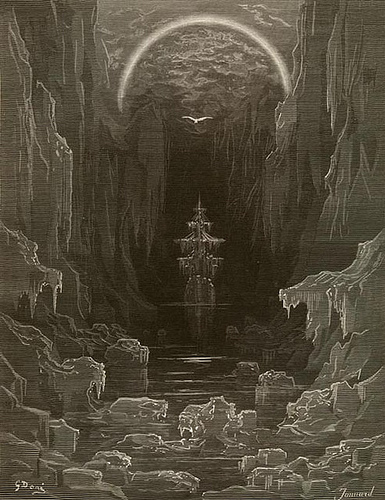Little did I know, when I posted on Rime of the Ancient Mariner last week, that at that moment there was a current group of scientists, journalists and tourist trapped by south sea ice. They were investigating the effect of climate change upon the Antarctic and first their ship was hemmed in by icebergs and now their rescue ship has been caught. A third ship is being sent.
What they really need is an albatross. Here’s how Coleridge describes such a situation:
And now there came both mist and snow,
And it grew wondrous cold:
And ice, mast-high, came floating by,
As green as emerald.
And through the drifts the snowy clifts
Did send a dismal sheen:
Nor shapes of men nor beasts we ken—
The ice was all between.
The ice was here, the ice was there,
The ice was all around:
It cracked and growled, and roared and howled,
Like noises in a swound!
As I noted in my post, the poem is a reminder that we can’t impose our will on nature. The irony in this case is that those trapped are aware of how humans are harming the planet. These are not people, in other words, who are out shooting albatrosses.
Those unconcerned with albatrosses, however, are the ones making hay about the incident—by which I mean those rightwing pundits who appear to think (I guess) that this is proof that the planet is not in fact warming up. Of course, as any good climatologist will tell you, that’s not how climate change happens and the ice entrapment proves nothing. Coleridge’s point still holds: we have been put on earth to love the planet, not to dominate it.
While we are on the subject of being trapped in ice, much of the United States is caught in extremely cold temperatures at the moment. Although this is causing a great deal of misery, poet Mary Oliver says there are also benefits to “tree-splitting” cold. For one thing, it gives us a chance to get real. Here’s her poem:
Cold Poem
By Mary Oliver
Cold now.
Close to the edge. Almost
unbearable. Clouds
bunch up and boil down
from the north of the white bear.
This tree-splitting morning
I dream of his fat tracks,
the lifesaving suet.
I think of summer with its luminous fruit,
blossoms rounding to berries, leaves,
handsful of grain.
Maybe what cold is, is the time
we measure the love we have always had, secretly
for our own bones, the hard knife-edged love
for the warm river of the I, beyond all else; maybe
that is what it means, the beauty
of the blue shark cruising toward the tumbling seals.
In the season of snow,
in the immeasurable cold,
we grow cruel but honest; we keep
ourselves alive,
if we can, taking one after another
the necessary bodies of others, the many
crushed red flowers.
I understand Oliver to be saying that, when we are in the grip of extreme cold, when we feel the breath of death upon us, that is when we value life the most. Just as the polar bear’s fat, its life-saving suet, keeps it alive in extreme conditions, so we focus on our essential life at such moments as this. Dreaming of anything else, of summer’s luminous fruit, becomes a luxury. Our focus, our “hard knife-edged love,” is for our “own bones,” for “the warm river of the I.” We must acknowledge the life force that burns within us.
That’s why, Oliver says, we are so fascinated by “the blue shark cruising toward the tumbling seals”: we identify with this battle between life and death and know that, in this primal struggle, we need, no less than the shark, to take into ourselves the bodies of others. That’s why we find it beautiful.
The cold season, Oliver says, is a season of cruelty and of honesty. Hold that thought in your mind the next time you take a step out into sub-zero temperatures.


